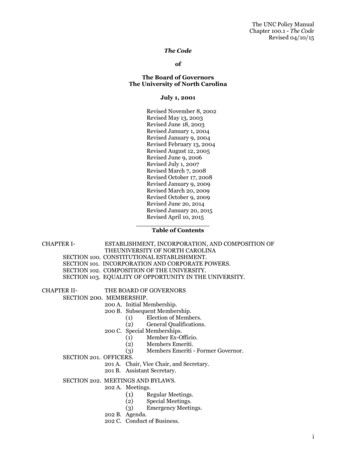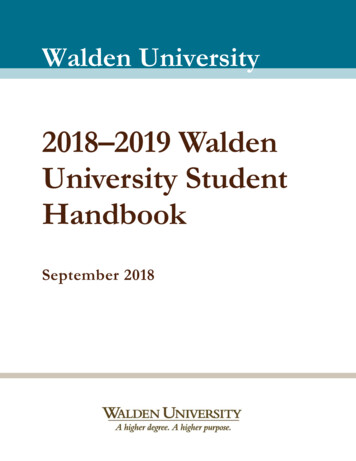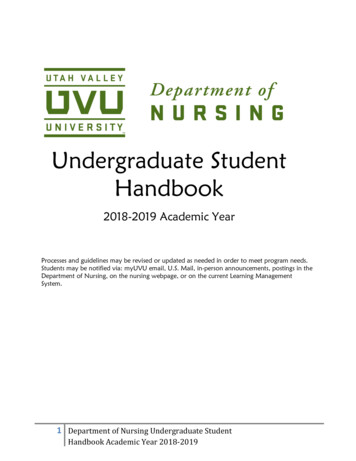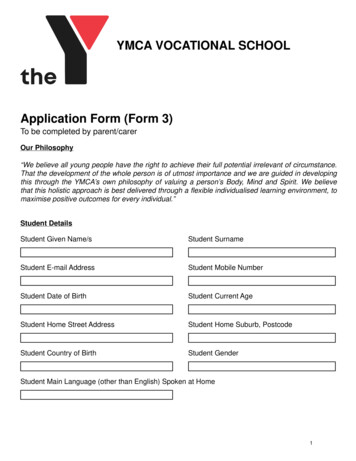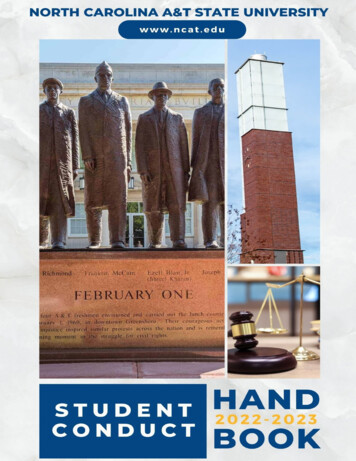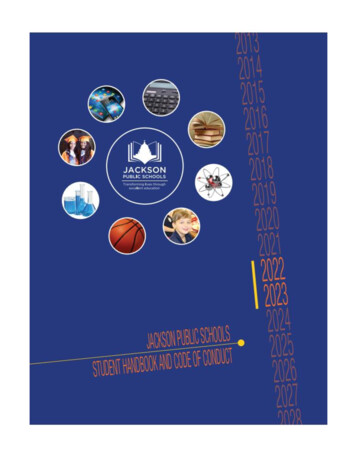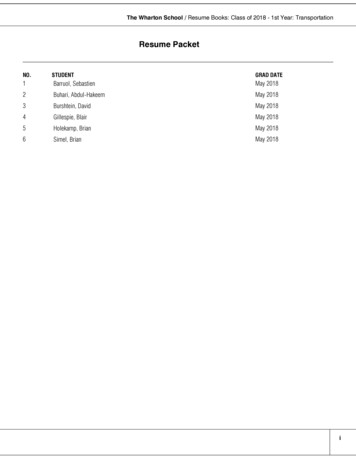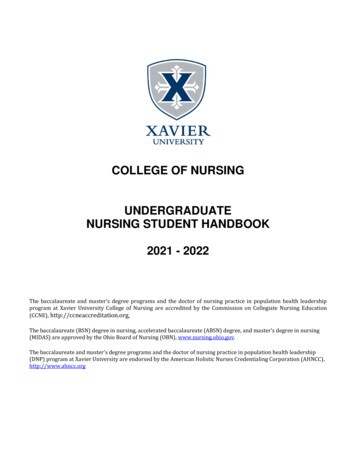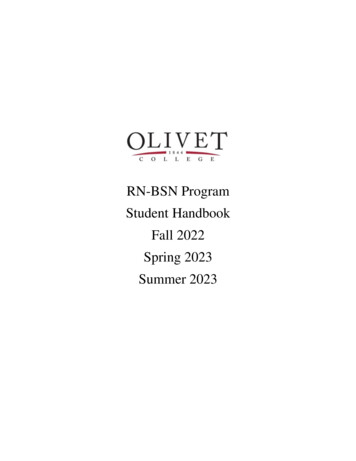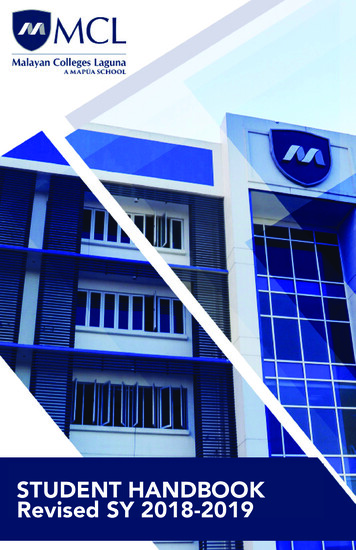
Transcription
STUDENT HANDBOOKRevised SY 2018-2019
STUDENT HANDBOOKREVISED SY 2018-2019
Table of ContentABOUT MALAYAN COLLEGES LAGUNAThe Mission of Malayan Colleges LagunaThe Vision of Malayan Colleges LagunaOur MottoOur LogoOur Core ValuesOur Quality PolicyHistory of Malayan College LagunaThe Colleges / Academic DepartmentsAdministrators and OfficersACADEMIC POLICIESAdmission of Applicants for Degree ProgramsApplication Requirements for FreshmenEnrollment Requirements for FreshmenApplication Requirements for Non-FreshmenEnrolment Requirements for Non-FreshmenStudent Enrollment General GuidelinesRegistration in A CourseMaximum Course LoadPre-Requisite Course RegulationCo-Requisite Course RegulationRevision of Course LoadAbolition of Sections and Conversion to Tutorial SectionsOffering of Petition CoursesAttendanceOfficial Dropping of CoursesThe MCL Grading SystemGuidelines for Shifting to Another ProgramStatus Review (For Baccalaureate Programs)Guidelines for Readmission to Another Program Due toDisqualificationMaximum Residency RuleThe Final Grade ReportThe Dean’s Lists (for Baccalaureate Programs)The President’s Lists (for Baccalaureate Programs)Cancellation of EnrollmentLeave of AbsenceGraduationRequest for DiplomaRequest for Transcript Of RecordsRequirements for CHED Certification, Authentication andVerification (for Baccalaureate Programs)Requirements for Diploma/Transcript of RecordsAuthentication (Local)Mailing of Transcript of Records to Other Entities Other Than theStudent AbroadTransfer Credentials (Honorable Dismissal)CertificationsAwards and Honors for Baccalaureate ProgramsJose Rizal Award for Excellence and Virtue in Community 151618181920202020212222222323232324242425
TUITION FEES AND OTHER CHARGESGeneral InformationRefund of FeesPage252526STUDENT SERVICESStudent Affairs OfficeCenter for Student Activities and DisciplineCenter for Guidance and CounselingCenter for Scholarships and Financial AssistanceScholarshipsCenter for Student AdvisingCenter for Learning and Information ResourcesCenter for Health Services and WellnessRegistrar’s OfficeLearning Environments and Innovations Office2626272728282929293030EXTENSION SERVICESCenter for Service-Learning and Community EngagementSocial and Ethical Responsibility for Values Embodiment (SERVE)National Service Training Program (NSTP)30303232ADMINISTRATIVE SERVICESOffice for Human Resources and Administrative ServicesOffice for Quality ManagementOffice for Corporate CommunicationsOffice for Strategic Partnerships and Global EngagementsInstructional Facilities OfficeSecurity ServicesBlue and Silver BookshopFood Services (Cafeteria)Campus Development and Maintenance OfficeInformation Technology Services OfficeRadio Frequency (RF) Identification SystemThe MCL WebsiteElectronic Mail SystemWi-Fi Access Anytime and Anywhere333333343435353636363636373737STUDENT RULES AND REGULATIONOverviewRights and Responsibilities in the ClassMCL Students Code of Conduct and DisciplineTypes of MisconductTable of Offenses and Corresponding Disciplinary ActionsAdministration of Student DisciplineStandard Attire on CampusConduct of Student ActivitiesPolicies Governing Student OrganizationsGovernment Regulations on Student Discipline3737383940414546464957
THE MISSION OFMALAYAN COLLEGES LAGUNA1. To provide the learning environment that would transform our students intoglobally competitive professionals;2. To produce social wealth from the generation of new knowledge;3. To contribute to the solution of industry’s and society’s problems by theexpert application of knowledge.THE VISION OFMALAYAN COLLEGES LAGUNABeing true to its nature, MCL has to contend with other schools even as it collaborates with them in the advancement of common interests. Its stance shall bedifferentiation in the level of its services. It goes for the attainment of the highestquality educational standards.In today’s world, it makes sense to aim for global standards. The market for graduates is global. The market of students is global. There is no reason why the marketfor research and consultancy cannot be global.Thus the vision statement:Malayan Colleges Laguna shall be a global steeple of excellence in professionaleducation and research.OUR MOTTO“Excellence and Virtue”OUR LOGOThe globe represents the school’s aspiration to be ultimately international incharacter, standard and reach. The letter “M” is for Malayan and is formed by asingle helix representing a strand of DNA at the time of its replication. It represents life to the betterment to which the school commits itself.The iconic figures stand for all the great minds that the faculty and studentsinteract within the confines of the school: Albert Einstein representing scienceand technology, William Shakespeare representing the other realms of thoughtand expression, and Dr. Jose Rizal, Son of Laguna and “Pride of the Malay Race”representing the force of the Filipino intellect and will to change the world.STUDENT HANDBOOK Revised SY 2018-20191
Malayan Colleges Laguna’s logo was redesigned to represent the level of excellence that MCL is striving to make itself known for. The goal was to make it scholastic, iconic and modern. The coat of arms or shield is a symbol of achievement, protection and identification. The single helix “M” is a symbol of the excellence embedded in our DNA.OUR CORE VALUES:Excellence, Loyalty, Teamwork, Discipline, and UrgencyOUR QUALITY POLICY:We commit to continually improve our management system to attain our studentoutcomes and program educational objectives.HISTORY OFMALAYAN COLLEGES LAGUNAWhen the ownership of the Mapúa Institute of Technology was transferred to theYuchengco Group of Companies (YGC) under the stewardship of the honorableAmbassador Alfonso T. Yuchengco in the year 1999, a great amount of effort wasput into improving the academic programs and facilities of the institution, thusraising Mapúa’s level to be at par with international standards.Through the years, new programs such as Computer Science, Information Technology, Material Science and Engineering, Biotechnology, Nursing, Psychology, Accountancy, and Hotel and Restaurant Management have been added to Mapúa’soffering of Engineering and Architecture programs.The expansion did not stop there, however. In fulfillment of the long term development plan of Mapúa, a six-hectare land was acquired for its expansion and presence in Laguna, which stands as one of CALABARZON’s industrial and commercialhubs.Groundwork started in late 2005, and on January 23, 2006, Malayan Colleges Laguna (MCL) acquired its corporate personality following its registration with theSecurities and Exchange Commission.This paved the way for the creation of an interim group geared to ensure the ultimate achievement of MCL’s vision and mission statements. Under the leadershipof Dr. Reynaldo B. Vea, Mapúa President and CEO, and concurrently the MCL President and CEO, were the following members from Mapúa, namely:Milagros V. Reyes, former Mapúa Executive Vice President for Administration and2STUDENT HANDBOOK Revised SY 2018-2019
Chief Operating Officer; Engr. Dodjie S. Maestrecampo, then Executive Vice President for Academic Affairs; Engr. Dennis H. Tablante, Dean of the School of EE-ECECoE; Engr. Christopher F. dela Rosa, Director of Mapúa’s Development Office forInformation Technology; and Raoul A. Villegas, Controller of the Mapúa IT Center.In November 2006, the Commission on Higher Education (CHED) gave the approval for MCL to offer eight (8) programs of study in Engineering, InformationTechnology, and Business. This was after MCL’s satisfactory compliance with thestandards of the CHED’s Regional Quality Assurance Team.MCL started with over 860 freshmen students during its first year of operations. Itsfirst two buildings were named after two significant personalities: Dr. Jose P. Rizaland Enrique T. Yuchengco.Three (3) colleges were initially established under MCL: the Mapúa Institute ofTechnology at Laguna (MITL), the E.T. Yuchengco College of Business (ETYCB),and the College of Information Technology, which was later renamed as the College of Computer and Information Science (CCIS). The College of Arts and Science(CAS) and the Mapúa-PTC College of Maritime Education and Training (Mapúa-PTCCMET) were eventually added, followed by the Institute for Excellence in Continuing Education and Lifelong Learning (I-ExCELL).MCL’s most recent undertaking is the establishment and opening of MCL SeniorHigh School, its response to the implementation of K-12 in basic education.To shelter the institution’s growing community, the Albert Einstein Building wasrecently constructed, named after the scientist who, in his lifetime’s work, exudedMCL’s motto: Excellence and Virtue.Today, MCL offers a total of twenty-one (21) college programs catering to the fieldsof engineering, architecture, business, information technology, communication,multimedia arts, hospitality management, tourism management, and maritime education; and one (1) diploma program in culinary arts. Recent additions to theseare six (6) strands under the Academic and Technical-Vocational-Livelihood Tracksof MCL Senior High School.THE COLLEGES / ACADEMIC DEPARTMENTS:COLLEGE OF ARTS AND SCIENCE (CAS)The College of Arts and Science offers the following programs: Bachelor of Multimedia Arts Bachelor of Arts in Communication Bachelor of Science in Environmental ScienceCOLLEGE OF COMPUTER AND INFORMATION SCIENCE (CCIS)The College of Computer and Information Science offers the following programs: Bachelor of Science in Computer Science. Bachelor of Science in Information Technology Bachelor of Science in Information SystemsSTUDENT HANDBOOK Revised SY 2018-20193
E.T. YUCHENGCO COLLEGE OF BUSINESS (ETYCB)The E. T. Yuchengco College of Business offers the following programs: Bachelor of Science in AccountancyBachelor of Science in Accounting Information SystemBachelor of Science in EntrepreneurshipBachelor of Science in Hospitality ManagementBachelor of Science in Tourism ManagementMAPÚA INSTITUTE OF TECHNOLOGY AT LAGUNA (MITL)The Mapúa Institute of Technology at Laguna offers the following programs: Bachelor of Science in ArchitectureBachelor of Science in Chemical EngineeringBachelor of Science in Civil EngineeringBachelor of Science in Computer EngineeringBachelor of Science in Electrical EngineeringBachelor of Science in Electronics EngineeringBachelor of Science in Industrial EngineeringBachelor of Science in Mechanical EngineeringMAPÚA-PTC COLLEGE OF MARITIME EDUCATION AND TRAINING (MAPÚAPTC CMET)The Mapúa-PTC College of Maritime Education and Training offers the followingprograms: Bachelor of Science in Engineering Bachelor of Science in Marine Transportation Bachelor of Science in Marine Engineering Bridging Program for the BSMechanical Engineering Bachelor of Science in Marine Engineering Bridging Program for the BSElectrical Engineering Bachelor of Science in Marine Engineering Bridging Program for the BSElectronics EngineeringINSTITUTE FOR EXCELLENCE IN CONTINUING EDUCATION AND LIFELONGLEARNING (I-ExCELL)The Institute for Excellence in Continuing Education and Lifelong Learning offersthe following programs: Cookery NC II*Bread and Pastry Production NC II*One-Year Diploma in Culinary ArtsCertificate in Digital PhotographyCertificate in Video ProductionCertificate in Graphic DesignCertificate in Motion Graphics and Visual EffectsShort-Term Courses*TESDA programs leading to One-Year Diploma in Culinary Arts4STUDENT HANDBOOK Revised SY 2018-2019
MCL SENIOR HIGH SCHOOL DEPARTMENTThe MCL Senior High School Department offers the following tracks/strands: Academic Tracko Accountancy, Business and Managemento Humanities and Social Scienceso Pre-Baccalaureate Maritimeo Science, Technology, Engineering and Mathematics Technical Vocational and Livelihoodo Home Economicso Information and Communications TechnologyADMINISTRATORS AND OFFICERS OFMALAYAN COLLEGES LAGUNABOARD OF TRUSTEESThe Board of Trustees is the primary governing body of Malayan Colleges Laguna. It is composed of a Chairman, and several members that are elected at largeduring a regular meeting of the collegial body. Administration and operations ofMCL are directed by the decisions of the board. Which is considered to be thehighest policy-making body of the Institution within the framework of the organization and its corporate governance.The Board has the power to create and abolish the management committee; ratify appointments of MCL’s officers, issue authorization of MCL’s top managementofficers for specific capacities, and mission; as well as confirming statutes of theAcademic Council such as but not limited to declaration of graduates, confermentof awards and other resolutions that need the concurrence of the Board.MANAGEMENT COMMITTEEThe Management Committee (ManCom) is a permanent body created by theBoard of Trustees to oversee the operations and management of MCL to ensurethat it serves its mission, vision, and interests of its stakeholders. Membershipto this committee is directed by the Chairman of the Board of Trustees from thetop management officers of MCL specifically the Chief Executive Officer, ChiefFinance Officer, Chief Operating Officer, Chief Administration Officer; and representatives of MCL’s subsidiaries particularly the Mapua University and the Houseof Investments.OFFICE OF THE PRESIDENT AND CHIEF EXECUTIVE OFFICERThis office handles the institutional decision-making and overall development planof MCL. The President is the Chief Executive Officer who is responsible for the efficient and effective administration of MCL towards the realization of its goals andobjectives. The President is in charge of school administration, supervision andimplementation of governing board policies. Therefore, all the details and specificarrangements in carrying out the policies and general plans of the institution asworked out by the President should have the necessary financial and material aidand moral support of the Board.STUDENT HANDBOOK Revised SY 2018-20195
OFFICE OF THE EXECUTIVE VICE PRESIDENT AND CHIEF OPERATINGOFFICERThis office handles the overall supervision and administration of MCL to ensure thealignment and consistent implementation of policies, procedures and strategies,and the effective delivery of functional support and services.The Executive Vice President (EVP) is the Chief Operating Officer of MCL. TheEVP is appointed by the President to manage, direct and control the operations ofthe entire institution. He/she is responsible for its efficient, effective and orderlyoperations. As part of the top management, and as a member of the ExecutiveCommittee, the EVP participates in formulating major policy decisions for MCL.The EVP assists the President in all matters affecting the general policies of theentire institution.OFFICE OF THE VICE PRESIDENT FOR FINANCE / CHIEF FINANCE OFFICERThis office is responsible for the management of the budget, finance and accounting and financial analysis concerns of MCL to ensure that the institution is maximizing its resources. The Chief Finance Officer (CFO) is the custodian of the fundsof MCL and is responsible for all money and property under his charge. The CFOkeeps full and accurate records and accounts of all receipts, disbursements, assets,liabilities and general financial transactions of MCL.The key offices under the Office of Vice President for Finance are: Accounting Office (ACO), Blue and Silver Bookshop, Purchasing Office (PO), and the Treasurer’sOffice (TO).OFFICE OF THE SENIOR VICE PRESIDENT FOR ADMINISTRATION ANDLEGAL / CHIEF ADMINISTRATIVE OFFICE AND LEGALThis office handles the overall supervision non-academic services and operationsinside MCL. The Senior Vice President for Administration (SVPA) ensures a productive and healthy work environment among the members of the MCL community.The SVP devises organized work systems and sustains a conducive workplace touphold total performance efficiency of MCL employees. The office also handleslegal matters pertaining to the administration of MCL.The key offices under the office of the SVPA are the: Office of the Assistant VicePresident for Human Resources and Administrative Services (OHRAS); InstructionalFacilities Office (IFO); Information Technology Services Office (ITSO); and the Purchasing Office (PO). Under OHRAS are the: Human Resources and ManagementOffice (HRMO); Center for Health Services and Wellness (CHSW); and Campus Development and Maintenance Office (CDMO).OFFICE FOR CORPORATE COMMUNICATIONSThe Office for Corporate Communications is responsible in upholding the positiveimage of MCL by maintaining and developing its reputable brand through the composition of promotional materials in forms of graphic design, articles, and digitalmedia for internal and external communications.OFFICE FOR STRATEGIC PARTNERSHIPS AND GLOBAL ENGAGEMENTThe Office for Strategic Partnerships and Global Engagement (OSPGE) is the6STUDENT HANDBOOK Revised SY 2018-2019
academic institutions that share the same vision and value for collaboration andmutual cooperation, government agencies and instrumentalities, non-governmentorganizations, and private groups.OFFICE FOR RISK MANAGEMENT AND BUSINESS CONTINUITYThe Office for Risk Management and Business Continuity (ORMBC) is the institutionalized administrative center whose main thrust is to implement policies andstrategies aimed at strengthening the ability of MCL to respond and recover froman emergency or disaster.OFFICE FOR QUALITY MANAGEMENTTo uphold MCL’s Quality Policy and support its mission and vision, the Office forQuality Management (OQM) ensures that necessary processes that compriseMCL’s Quality Management System (QMS) are adequately defined, effectively implemented, and continually improved.OFFICE OF THE VICE PRESIDENT FOR ACADEMIC AFFAIRSThis office handles the overall supervision and development of programs of all thecolleges and institutes. As the chief academic officer, the Vice President for Academic Affairs provides leadership in all academic programs, supports the missionsof respective Colleges, Institute, and the Senior High School Department to ensureoverall academic excellence.The key offices under the Office of Vice President for Academic Affairs are the:Registrar’s Office (RO); Admission’s Office (ADO); Research Promotion and Coordination Office (RPCO); Center for Learning and Information Resources (CLIR);Student Affairs Office (SAO); Learning Environments and Innovations Office (LEIO);Athletics and Physical Education Office (APEO); and the Center for Service-Learning and Community Engagement (CSCE).ACADEMIC COUNCILThe Academic Council is composed of key officers throughout the Institution whomeet to discuss and decide on issues and promulgations that have an overall effecton the entire organization or its major components thereof. It is responsible forthe quality of academic performance. It evaluates curriculum and faculty academicperformance, recommends academic policies, plans programs, sets standards, andreviews guidelines for implementation by the different colleges and concernedoffices. The members of the Academic Council are the Vice President for AcademicAffairs, Executive Vice President, Deans, Program Chairs, and Directors of the different academic offices.COLLEGE DEANThe College Dean is the senior officer responsible for the operation of an academicprogram, the enforcement of rules and regulations and the supervision of all activities of his college. The Dean is responsible for the academic operations and theselection of faculty members, the quality of instruction, and the academic budget.STUDENT HANDBOOK Revised SY 2018-20197
PROGRAM CHAIR / COORDINATORThe Program Chair is responsible for providing professional support and assistancein the implementation of academic programs and enforcing approved academicand administrative policies, procedures and rules and regulations involving his academic program. He or she exercises educational leadership among his or her faculty members and cooperates in activities towards the attainment of the programeducational objectives.CLUSTER COORDINATORThe Cluster Coordinator assists the College Dean in coordinating the activities andfunctions of a designated cluster to ensure that goals and objectives specified forgeneral education and other relevant courses are accomplished in accordance withestablished priorities. The Cluster Coordinator also provides academic leadershipamong the faculty members under the cluster.SENIOR HIGH SCHOOL PRINCIPALThe Senior High School Principal is a member of the faculty of the Senior HighSchool Department who is appointed to perform administrative, academic, andinstructional leadership functions of the department. The Principal is directly reporting to the Vice-President for Academic Affairs and Chief Academic Officer.As department head, the Principal has direct control and supervisory functionsover the Assistant Principal, and Course Coordinators including positions that maybe appointed to serve and perform specific responsibilities for its managementand operations.The principal is a permanent member of the Academic Council Core Group andalso chairs any sub-committee or ad hoc body that may be formed relevant toSHS’s administration, and management.DIRECTOR / ACADEMIC OFFICERDirectors are the heads of offices and centers that serve to support Academicdepartments of MCL. Generally, directors are classified as non-teaching administrators except for instance where they are assigned with auxiliary academic functions and responsibilities. For offices whose main function has no directly link tostudents, “manager” is used as the official appointment of its department head.As of this publication, Directors head the following officers/ centers of MCL:1. Admissions Office2. Center for Learning and Information Resources3. Center for Service-Learning and Community Engagement4. Information Technology Services Office5. Learning Environments and Innovation Office6. Office for Corporate Communications7. Office for Quality Management8. Office for Strategic Partnerships and Global Engagement9. Research Promotion and Coordination Office10. Student Affairs Office8STUDENT HANDBOOK Revised SY 2018-2019
STUDENT HANDBOOK Revised SY 2018-20199
ACADEMIC POLICIES:ADMISSION OF APPLICANTS FOR DEGREE PROGRAMSMCL categorizes applicants for degree programs as either a freshman, a transferee, or a degree holder. Appropriate admission examination and/or its equivalent isadministered to qualified applicants based on the degree of their acquired knowledge and proficiency.APPLICATION REQUIREMENTS FOR FRESHMENThe following are the requirements to be submitted by the college freshman applicant to be able to take the MCL Entrance Examination (MCLEE):1. Duly accomplished application form2. Photocopy of any of the following: Grade 12 report card Certificate of candidacy for graduation Grade 12 School ID Bureau of Alternative Learning System (BALS) or Philippine EducationalPlacement Test Certificate of Passing3. Photocopy of NSO/PSA birth certificate4. Two (2) pieces 1.5” x 1.5” recent identical pictures with plain background.Additional for graduates of high school for the previous year(s):1. Photocopy of high school report card; and2. Certificate of available Form 137-ANOTES: MCL-SHS graduates do not need to take the entrance exam. However, thosegraduates whose strand is not aligned with the program of choice will needto take a bridging program. A foreign applicant who is a non-native speaker of English has to submitTOEFL/IELTS examination results. If the applicant has not taken the TOEFLor IELTS or failed the exam upon application, the student is requested to takean English course in MCL as an Audit Course prior to admission as freshman. Application and examination results are valid for one (1) academic year. Applicants who lost their report card must submit a Certificate of Eligibility toTransfer to College / Tertiary Education, and Notarized Affidavit of Loss. Marine applicants must pass the recommended medical examination administered by an MCL accredited clinic.ENROLLMENT REQUIREMENTS FOR FRESHMENThe following documents are to be submitted by those who passed the MCLEE toenroll in college:1. Original Grade 12 report card duly signed by the Senior High School Principal showing: (a) the applicant’s eligibility for admission to college; and (b)Learner Reference Numbera. The principal/adviser must countersign the report card if it has erasuresor alteration.10STUDENT HANDBOOK Revised SY 2018-2019
2.3.4.5.6.7.b. The principal/adviser must countersign the report card if it has erasuresor alteration.c. The applicant must submit a certificate of the school’s numerical equivalent if the report card contains alpha grades.d. The applicant must submit an authenticated report card if he graduatedfrom an international school.f. The applicant must submit an original certificate from the High SchoolPrincipal stating that the Form 137-A is still in the school file and has notbeen forwarded to any colleges or universities if the applicant graduatedin previous years.Certificate of Good Moral Character from the Senior High School Principal(with the issued year of graduation and school seal)Photocopy of NSO/PSA birth certificate (original must be presented forverification)a. If the applicant is not a Filipino citizen, submit: (a) original and photocopyof passport with remaining validity of at least 6 months; (b) Alien Certificate of Registration (ACR); (c) Student visa or student study permit.b. If the applicant has dual citizenship, submit (a) Certificate of recognitionas a Filipino citizen or Philippine Passport;(b) Authenticated birth certificateTwo (2) pieces 1.5” x 1.5” recent identical pictures with plain backgroundand signature at the back).Medical Clearance Form from CHSW for Marine enrollees.Result letter from Mapua with list of qualified programs for Mapua Qualifiers.One (1) big brown envelope (Kraft/Legal Size) to contain all of the above.APPLICATION REQUIREMENTS FOR NON-FRESHMENThe following are the requirements to be submitted by non-freshman applicants tobe able to take the MCL Qualifying Examination:1. Duly accomplished admission form2. Original and photocopy of Transcript of Records (TOR) or of Photo-copy ofCertified True Copy of Grades.3. Two (2) pieces 1.5” x 1.5” recent identical pictures with plain background.4. Certified True copy of course description (for course crediting purposes).NOTES: A Mapua transferee with good academic standing must take the profilingexamination. If passed, then the applicant will proceed with the Pre-enrollment procedures. If failed, an interview with the Center for Guidance andCounseling will be set. A Mapua transferee under probationary status or disqualified from thecurrent Mapua program must take the qualifying examination. If passed, aninterview with the Center for Guidance and Counseling will be conducted.Otherwise, the applicant will not be permitted to enroll. An applicant’s previous program should be CHED accredited in order forthe courses to be credited. For an applicant who has been absent / inactive for more than 5 years fromthe previous college or university, a recommendation letter (employer, barangay) shall be submitted in lieu of the good moral character certificate.STUDENT HANDBOOK Revised SY 2018-201911
A foreign applicant who is a non-native speaker of English has to submitTOEFL/IELTS examination results. If the applicant has not taken the TOEFLor IELTS or failed the exam upon application, the student is requested totake an English course in MCL as an Audit Course prior to admission astransferee. Application and examination results are valid for one (1) academic year. Admission of non-freshmen is allowed during regular terms only.ENROLMENT REQUIREMENTS FOR NON-FRESHMENThe following documents are to be submitted by those non-freshmen who passedthe MCL Qualifying Examination to enroll in college:1. Original copy of one of the following: (a) Transfer Credential Certificate; (b)Honorable Dismissal Certificate; (c) Clearance to Transfer Certificate; (d)Certificate of Graduation (for degree holders)2. Original Transcript of Record (TOR). This should be authenticated by thePhilippine Embassy from country of origin if the applicant is a graduate froman international school.3. Original or certified True copy of course/subject description4. Original Good Moral Character Certificate5. Two (2) original recommendation letter (for degree holders)6. Photocopy of NSO/PSA birth certificate (original to be presented for verification) If the applicant is not a Filipino citizen, submit: (a) original and photocopyof passport with remaining validity of at least 6 months; (b) Alien Certificate of Registration (ACR); (c) Student visa or student study permit. If the applicant has dual citizenship, submit (a) Certificate of recognitionas a Filipino citizen or Philippine Passport;(b) Authenticated birth certificate7. Two (2) pieces 1.5” x 1.5” recent identical pictures with plain background.8. Medical Clearance Form from CHSW for Marine enrollees.STUDENT ENROLLMENT GENERAL GUIDELINESMCL students are expected to pursue their studies on a full-time basis and toself-manage their registration of courses each term. For each MCL degree program, there is an approved course of study that meets college and institute requirements.Undergraduate degree programs require full-time enrolment which are defined bythe student’s program curriculum. Unless permission is granted by the college enrolled graduate students must maintain his total course load within the prescribedlimits.A certificate of matriculation is electronically accessible to student upon successfulregistration of his courses each term. Amendments to a student’s course load maybe allowed
The single helix "M" is a symbol of the excellence embedded in our DNA. OUR CORE VALUES: Excellence, Loyalty, Teamwork, Discipline, and Urgency OUR QUALITY POLICY: We commit to continually improve our management system to attain our student outcomes and program educational objectives. HISTORY OF MALAYAN COLLEGES LAGUNA
